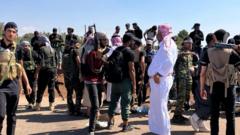Bedouin fighters in southern Syria have stated their intention to observe a ceasefire with the Druze community in Suweida but are not ruling out a return to fighting if their demands are not met. Following a week of intense sectarian clashes, the Bedouins retreated from the city to surrounding areas after a ceasefire was announced. However, reports indicate ongoing tensions, including tribal attacks and heavy government police presence preventing Bedouins from re-entering the city.
As the ceasefire took effect, smoke was noted rising from Suweida, with Bedouin fighters crowding near checkpoints expressing frustrations over the fate of their injured members still within the city, which they consider hostages. If the government does not comply with the ceasefire terms and release the wounded, Bedouin leaders warned they might force their way back into the city despite the risk.
The sectarian violence erupted from a backdrop of longstanding animosity between the Druze and Bedouin tribes, exacerbated by the abduction of a Druze merchant. The situation was further complicated by government forces deploying to the area, resulting in both sides accusing each other of committing atrocities.
Despite a temporary calm established by the ceasefire, the Syrian Observatory for Human Rights has reported over 1,120 deaths in the recent clashes, continuing to highlight the gruesome toll of this conflict. The humanitarian crisis worsens, with at least 128,000 individuals displaced and critical medical shortages reported in Suweida.
The ongoing violence has drawn international attention, prompting demands for accountability from U.S. officials. Bedouin refugees in surrounding villages express doubts about future coexistence with the Druze, citing a lack of trust under current conditions. Peace requires effective governance from Damascus, they argue, as instability fuels continued conflict.



















